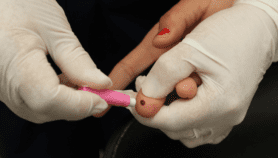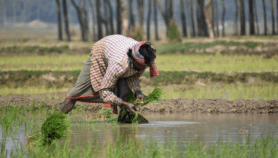By: Pinaki Roy
Send to a friend
The details you provide on this page will not be used to send unsolicited email, and will not be sold to a 3rd party. See privacy policy.
Firdausi Qadri believes that in fighting cholera sanitation is as important as vaccines.
[DHAKA] SciDev.Net speaks to Firdausi Qadri, director, Centre for Vaccines Science, International Centre for Diarrhoeal Diseases Research, Bangladesh, who claimed the CNR Rao prize of The World Academy of Science this year for her work in developing mass immunisation strategies against cholera.
Caused by ingestion of food or water contaminated with the Vibrio cholera bacterium, cholera is believed to have originated in the Ganges basin. Scientists continue to search for appropriate antibiotic treatment and effective vaccines against a disease that is closely linked to poor sanitation and lack of clean drinking water.
Qadri's research on infectious enteric diseases led her to become the first Bangladeshi and the first woman to be awarded the Christophe Merieux prize given by the Institut de France. She answers questions on the status of cholera, known as a disease of poverty.
What is the current status of the disease?
Cholera epidemics and outbreaks continue in over 50 countries globally. In the last two years, cholera has spread to new areas such as in Haiti where there was high case fatality rate as well as high numbers of patients with disease of severe magnitude.
What are the public health implications of the cholera pandemic?
Cholera epidemics cause morbidity and mortality in populations. They result in loss of productivity, expenditure on the part of the patients and their families and on governments.
What is the progress on cholera vaccines?
A number of WHO prequalified cholera vaccines are available commercially. One vaccine in particular has been formulated so that it can easily be delivered under field settings and is affordable for developing countries.
Would the same vaccine work in different regions?
The cholera vaccine has been designed so that it will work in different regions. However, studies are being carried out for protective efficacy in different countries in children and in adults to ascertain all this.
If these vaccines have been developed in collaboration with international partners, what are the costs and patents implications?
The vaccines are available commercially and hence Intellectual Property Rights issues have been addressed. One of the cholera vaccines is produced in a developing country setting together with support from international agencies and private funders.
What do scientists need to address mainly?
As with many other infectious diseases, there are several unanswered questions in cholera. The scientific community is working on ways to address problems from the public health, epidemiological, clinical and immunological perspectives. Public health interventions like hand washing, safe water and sanitation can be integrated with vaccines to help protect against the spread of cholera and other diseases through the oral-faecal route.
What is the likely impact of climate change on cholera outbreaks, especially in developing countries?
Climate change brings in floods and other natural disasters which increase epidemics and outbreaks. In addition, it leads to movement of people from rural areas to urban settings. This increases the number of people living in poor hygiene and sanitation conditions predisposed to cholera and other infectious diseases since many of these are spread through the oral-faecal route and by contaminated food and water. The lack of these facilities leads to infections and more cholera epidemics.














